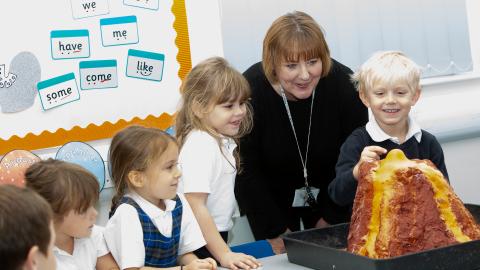A high-quality science education provides the foundations for understanding the world through the specific
disciplines of biology, chemistry and physics. Science has changed our lives and is vital to the world’s future prosperity, and all pupils should be taught essential aspects of the knowledge, methods, processes and uses of science. Through building up a body of key foundational knowledge and concepts, pupils should be encouraged to recognise the power of rational explanation and develop a sense of excitement and curiosity about natural phenomena. They should be encouraged to understand how science can be used to explain what is occurring, predict how things will behave, and analyse causes.
The Intent of our Science Curriculum
Science teaching at Threshfield Primary School aims to give all children a strong understanding of the world around them whilst acquiring specific skills and knowledge to help them to think scientifically, to gain an understanding of scientific processes and also an understanding of the uses and implications of Science, today and for the future. At Threshfield Primary, scientific enquiry skills are embedded in each topic the children study and these topics are revisited and developed throughout their time at school. Topics, such as Plants, are taught in Key Stage One and studied again in further detail throughout Key Stage Two. This model allows children to build upon their prior knowledge and increases their enthusiasm for the topics whilst embedding this procedural knowledge into the long-term memory. All children are encouraged to develop and use a range of skills including observations, planning and investigations, as well as being encouraged to question the world around them and become independent learners in exploring possible answers for their scientific based questions. Specialist vocabulary for topics is taught and built up, and effective questioning to communicate ideas is encouraged. Concepts taught should be reinforced by focusing on the key features of scientific enquiry, so that pupils learn to use a variety of approaches to answer relevant scientific questions.
The Implementation of our Science Curriculum
As their approach to the teaching and learning of science, teachers plan the following for each unit of work:
- A knowledge organiser which outlines the knowledge all children must master;
- Weekly key words, building up to a full bank of key vocabulary for the topic.
- Opportunities to apply a range of skills for ‘Working Scientifically’ which are grouped into Early Years, Key Stage 1, Lower Key Stage 2 and Upper Key Stage 2. Within these year groups, teachers ensure that these skills are revisited according to the unit of work.
- An informal activity at the start of every unit which assess children’s prior knowledge;
- An assessment mid-way through the next new unit to assess the sticky knowledge from the previous topic;
- A cycle of lessons for each unit, which carefully plans for progression and depth;
- The opportunity for children to engage in practical, investigative science;
- Challenge questions for pupils to apply their learning in a philosophical/open manner;
- Trips and visits from experts who will enhance the learning experience;
The Impact of our Science Curriculum
Our Science Curriculum is high quality, well thought out and is planned to demonstrate progression. If children are keeping up with the curriculum, they are deemed to be making good or better progress. In addition, we measure the impact of our curriculum through the following methods:
- A reflection on standards achieved against the planned outcomes;
- Regular book scrutiny which focuses on the progression of skills, knowledge and understanding throughout the curriculum
- Pupil discussions about their learning

